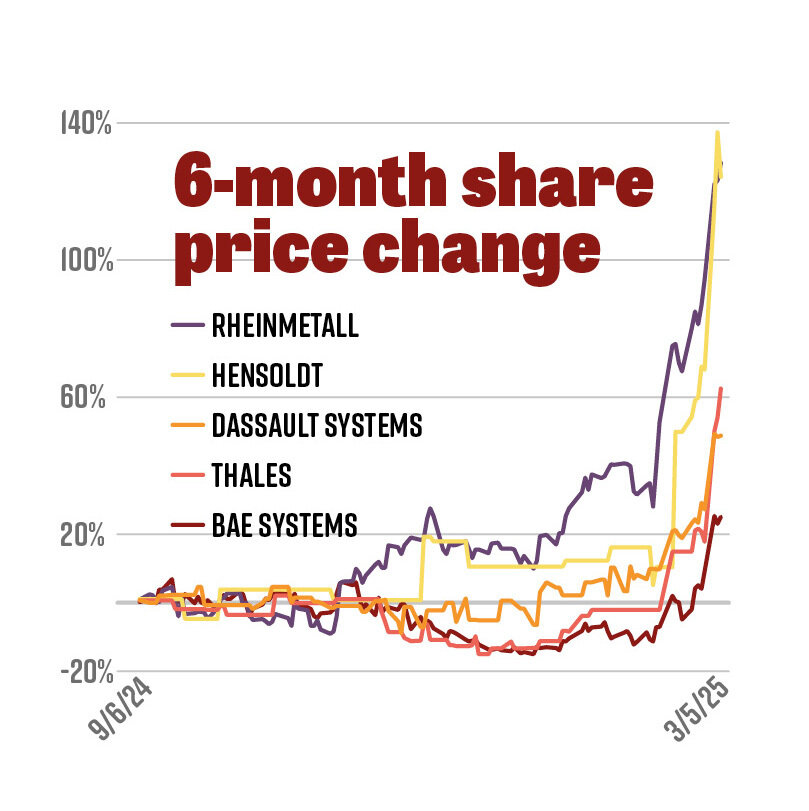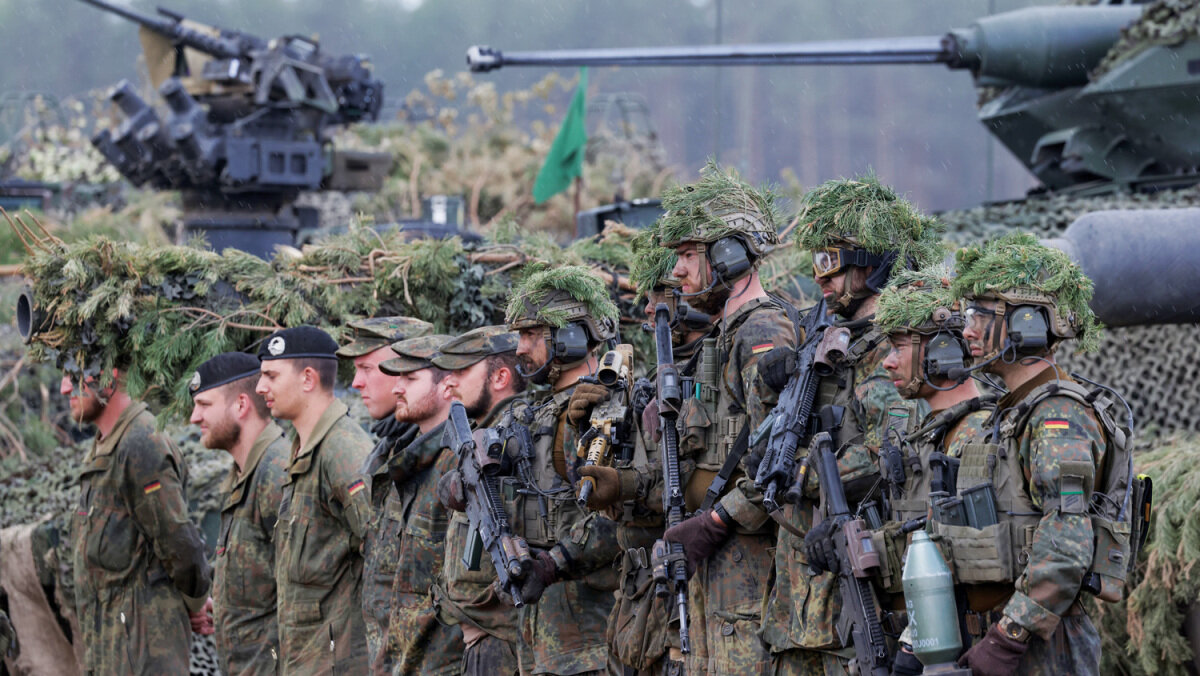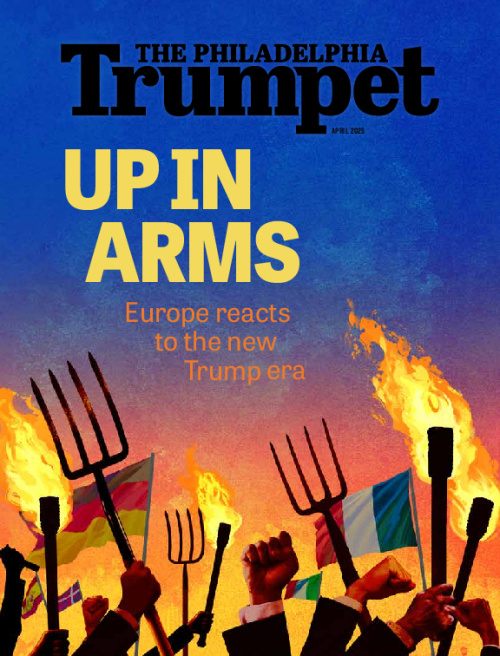Up in Arms

Up in Arms
Germany is moving fast to rearm. The nation held elections on February 23. It has yet to agree on a coalition—but on March 4 it agreed to what would be one of the biggest increases of the German military since the end of World War ii.
Donald Trump and Vladimir Putin have, between them, shocked Germany into action.
United States Defense Secretary Pete Hegseth traveled to Europe on February 10 demanding that European powers boost their spending—not to 2 percent of their annual economic output as President Trump demanded during his first term, but to 5 percent. Vice President JD Vance supported that message at the Munich Security Conference February 14-16, accusing Europe of turning its back on democracy and free speech, and warning that there would be no more support from America if this was the case.
Finally, on February 28 Donald Trump and Volodymyr Zelenskyy held their explosive meeting, arguing and shouting over each other in front of the press. Shortly afterward, Trump cut off aid and then intelligence from Ukraine.
Much of this is understandable. The U.S. does shoulder the burden of Europe’s defense. It has spent millions propping up Ukraine. It seems clear that Hunter Biden and other Biden family members had corrupt dealings in Ukraine that its current leaders have not exposed.
Nevertheless, these moves are terrifying Europeans. They are realizing they cannot rely on the U.S., and that without America’s protection they are naked and vulnerable in a dangerous world.
Germany Goes Nuclear?
Even before Germany’s elections, Friedrich Merz, Germany’s likely next chancellor, gave a bold speech. “We need to have discussions with both the British and the French—the two European nuclear powers—about whether nuclear sharing, or at least nuclear security from the [United Kingdom] and France, could also apply to us,” he said.
Politico noted that this marked “a huge shift in position” and “a major strategic shift for Germany.”
These are themes that French President Emmanuel Macron has brought up repeatedly, but that Germany has been coy about. In 2020, after one such outburst, Trumpet editor in chief Gerald Flurry wrote, “A clear trend is taking place: President Macron demands what Germany wants. I don’t believe Macron would ever say what he said unless Germany approved of it. He acts as a sort of puppet to Germany!”
“Imagine if a German chancellor gave a speech like Mr. Macron did, demanding that all Europe support Brussels’ dictates,” he wrote. “Germany wouldn’t dare make such a proposal right now! But it is definitely in Germany’s interest—and Macron is the one pushing for it!”
Now, Germany dares.
In his election victory speech, Mr. Merz continued with this theme. “My absolute priority will be to strengthen Europe as quickly as possible so that, step by step, we can really achieve independence from the U.S.A.”
That is a stunning statement from a German leader—and, again, reminiscent of statements from Macron.
Unsurprisingly Mr. Macron was quick to respond. Within days, a French official told the Telegraph they could easily send a military jet with nuclear bombs to Germany, and that such an action might also pressure Britain to share its nuclear missiles. Then Mr. Macron himself replied on March 5: “Responding to the historic call of the future German Chancellor, I have decided to open the strategic debate on the protection of our allies on the European continent through our (nuclear) deterrence.”
Germany currently has American nuclear bombs. But that gives the U.S. a lot of leverage: Do what we want, or we remove your nuclear umbrella. This offer from France strengthens them greatly against the U.S.
But the most dramatic announcement came from the leaders of main German parties on March 4.
A Military Superpower
The deal between the right-wing Christian Democrats (cdu) and left-wing Social Democrats (spd), proposed by Friedrich Merz, would amend the German constitution, eliminating all restrictions on military spending. The constitution limits how much Germany can borrow. Under the new deal, all military spending above 1 percent of gdp would not count toward the debt limit; if the money is for weapons, Germany can borrow as much as it likes. The deal would unlock €500 billion for infrastructure over 10 years and make it easier for states to borrow money.
These two parties introduced Germany’s constitutional balanced budget rule in 2009, and now they are ready to kill it.
EuroIntelligence called the plan “without a doubt the biggest U-turn in Germany since 1969 when Germany started to revalue the D-mark. And it has been made possible by Donald Trump. The sheer depth and the breadth of the coalition agreement goes beyond anything political observers, us included, imagined possible.”
Berenberg Bank’s chief economist, Holger Schmieding, called Merz’s proposal “a really big bazooka,” and “a fiscal sea change for Germany.” “Germany is finally taking on the leadership role which, given its size and its fiscal space, it should have assumed years ago,” he said.
Germany Thinks the Unthinkable
Leaked plans show Merz wants to spend an extra €400 billion on defense, though it is unclear on what timescale.
Back in 2022, Chancellor Olaf Scholz announced a €100 billion fund to boost defense spending. He was clear that it would be in addition to Germany spending 2 percent of its gdp on its military, the nato minimum. Later he watered down this pledge, and used the fund to bring Germany up to that nato minimum level of funding.
What Merz proposed is four times larger. Last year Germany spent €61.9 billion on its defense. An extra €400 billion is colossal. If spread over five years, German defense spending would more than double.
“The immense figures under discussion in Berlin would have been politically unthinkable a week ago, before the total loss of faith in U.S. friendship,” wrote the Telegraph’s Ambrose Evans-Pritchard. “If enacted on anything close to this scale, such a high-octane blast of military Keynesianism will entirely change the economic and geopolitical shape of the world” (March 5).
Marcus Söder—leader of the Christian Social Union party, which works with the Christian Democrats—spelled out what they wanted. “We need a drone force of 100,000 drones, 800 new tanks, 2,000 Patriot missiles and 1,000 Taurus just for Germany as a protective shield like the ‘Iron Dome,’” he said. “Only the strong will be taken seriously.”
European Military Spending
The same day as Merz voiced his plans, European Commission President Ursula von der Leyen announced a similar rearmament push for all of Europe. “We are in an era of rearmament,” she said. “Europe is ready to massively boost its defense spending.”
This plan would also mean that money borrowed for military spending would be exempted from European funding rules. The European Commission would provide €150 billion in loans for defense.

Von der Leyen’s plan will make a difference—but not as much as Merz’s. Many EU states are close to maxing out their credit cards. France is the EU’s second-largest military spender. Their debt is 110 percent the size of their economy. Italy, in third place, has a debt-to-gdp ratio of over 130 percent. Neither can easily borrow more. By contrast, Germany’s debt-to-gdp ratio is just 62 percent. Germany already has the EU’s largest defense spending. Merz’s plan would make it imposingly dominant, leaving France and all other EU nations in the dust.
Across Europe, stocks in defense firms are soaring. Rheinmetall shares rose nearly 20 percent in the few days of trading after the Trump-Zelenskyy fracas. bae Systems rose 16 percent; Germany’s Hensoldt AG, more than 30 percent; France’s Dassault Aviation, 10 percent; France’s Thales SA, which makes defense electronics, better than 20 percent. Investors clearly expect a bonanza of military spending.
Redesigning Factories
While defense is booming, Europe’s manufacturing industry as a whole is struggling. There is an obvious solution.
Germany’s current chancellor, Olaf Scholz, announced in February that the Alstom train factory in Görlitz would stop making train carriages and instead build tanks, after the Franco-German defense giant knds took it over. A few weeks later, Rheinmetall announced it will retool two factories making car parts into manufacturing ammunition.
The Italian news outlet Corriere della Sera published leaked details of plans to shift Italy’s auto industry to making arms. Subcontractors in Italy currently make parts for the German car industry; they could shift to supplying the German arms industry. “It is becoming obvious to everybody that defense spending is the way to offset job losses in the car industry,” said Schmieding.
An Attack on Democracy
If Merz pulls off his plan, it will be huge. But there are significant obstacles. Amending Germany’s constitution requires a two-thirds majority in parliament. That won’t be possible once the new parliament takes power. The Communist Left party and far-right Alternative für Deutschland (AfD) hold a blocking minority. The AfD has already condemned the proposals as an “orgy of debt.” Before the AfD became an anti-migration party with a revisionist history of World War ii, it was a party of nerdy economists that hated borrowing and inflation. That aversion remains in its dna. Convincing the AfD to back this proposal would be almost impossible.
But Merz is playing fast and loose with the “democratic norms” the mainstream claim to love.
Merz hopes to take advantage of the maximum-30-day gap between the election and the seating of the new Bundestag. With the old parliament still around until March 25 at the latest, there is a better chance of getting the two-thirds majority needed to modify the constitution.
That is pretty sketchy: Merz wants a parliament that was resoundingly voted out to change the national constitution. Getting the two-thirds majority will need the Greens party, which will probably insist on a lot of environmental spending as their price for cooperating. But there is a window for a deal.
If Merz is willing to push this through, he clearly has little regard for democracy. It could also boost support for the AfD. After all, it’s difficult to accuse your opponents of being undemocratic when you are pulling stunts like this.
This spending spree could create serious ramifications for all Europe. Investors will loan money to European countries because they know Germany has the resources for some bailouts. Though Germany would struggle to help France, Italy or Spain if they go bust, it can handle—and has handled—Portugal or Greece. But what happens to the eurozone if Germany maxes out its credit card like everyone else?
This level of spending will increase the pressure on the EU to make bigger financial reforms—to borrow money and coordinate spending as one entity rather than 27 countries struggling to work together.
Ahead of His Time
Herbert W. Armstrong warned of this military union for decades. In May 1953, he wrote that “10 powerful European nations will combine their forces.” In August 1978, he warned: “The Europeans are far more disturbed about their safety in relying on United States military power to protect them than Americans realize! … Europeans want their own united military power! They know that a political union of Europe would produce a third major world power, as strong as either the United States or the ussr—possibly stronger!”
This Bible-based forecast is critical to understand events in Europe. Revelation 17 describes a union of 10 kings with incredible military power.
After Vladimir Putin invaded Georgia, Trumpet editor in chief Gerald Flurry wrote in October 2008: “Mr. Armstrong often taught that a political or economic crisis would spark these ’10 kings’ to strongly unite very quickly. The fact that Russia has launched a war shows just how easily such a crisis could occur! Will the Georgia strike actually spark European unification? Will a crisis occur over Ukraine? That area is the breadbasket of Russia, and surely it is willing to wage war over that as well.”
The day Russia invaded Ukraine, Mr. Flurry sent out an e-mail warning, “The most important nation to watch right now is Germany. How will it respond to [Vladimir] Putin’s war on Ukraine? This Ukraine war is going to speed up the rise of the prophesied German-led Holy Roman Empire!”
Within days, Germany announced a historic turning point in its military spending. Scholz later watered that down, but it was a momentous shift nonetheless. What Merz has just proposed is considerably bigger.
This prophesied union of 10 kings is clearly a military union. Revelation 17:14 says these kings shall “make war.”

Many other passages warn of a great war-making power in this end time. In Isaiah 10:5-7, God says He has raised up Germany—end-time “Assyria”—to “destroy and cut off nations not a few.” Habakkuk references the same time period, calling the end-time European power “Chaldeans,” referring to its religious nature. He describes them as a “bitter and hasty nation, which shall march through the breadth of the land, to possess the dwelling places that are not theirs” (Habakkuk 1:6).
The Bible is full of prophecies foretelling a military empire that will march in and conquer Israel. “I will bring a nation upon you from far, O house of Israel, saith the Lord: it is a mighty nation, it is an ancient nation, a nation whose language thou knowest not, neither understandest what they say” (Jeremiah 5:15). Ezekiel 6:3 states: “Ye mountains of Israel, hear the word of the Lord God; Thus saith the Lord God to the mountains, and to the hills, to the rivers, and to the valleys; Behold, I, even I, will bring a sword upon you, and I will destroy your high places.”
Jeremiah and Ezekiel wrote their prophecies 100 years after ancient Israel went into captivity. Their warnings make no sense unless you realize that they are intended for when God would “bring again the captivity of … Israel” during “the time of Jacob’s trouble” (Jeremiah 30:3, 7).
The military power building in Europe right now is the one God prophesied would “bring again” this captivity.
These prophecies caused Mr. Armstrong to forecast Europe would become a military power. But he also saw from the Bible’s prophecies that this unification would not come easily.
“The nations of Europe have been striving to become reunited,” he wrote in the January 1979 Plain Truth. “They desire a common currency, a single combined military force, a single united government. They have made a start in the Common Market. They are now working toward a common currency. Yet on a purely political basis, they have been totally unable to unite.”
He saw that it would take fear of Russia, an economic crisis, the aid of the Catholic Church and the rise of a strong leader to make this happen. Many of these events are happening right now.
In 2014, Mr. Flurry wrote: “A second major prophecy that Russia’s invasion of Ukraine will bring about is the arrival of a strongman in Europe. A new leader is coming—a kind of Vladimir Putin. This is what Europe needs in order to bind together, to have the strength and unity of purpose needed to confront Russia.”
Merz is moving quickly and decisively. We don’t believe he will be that strong leader, but he could help bring that strong leader to power.
Shortly after Putin’s 2014 invasion, Mr. Flurry wrote, “So much of what God prophesied through Mr. Armstrong has already been fulfilled. Watch closely for the final part of these prophecies to emerge! ‘Ten kings’ are going to arise—and the 28 nations currently comprising the European Union are going to be pared down to 10. They are going to be led by a strong Putin-like dictator and unified by the Roman Catholic Church. At that point, they will present to the world a power even greater than that of Russia or the United States!” (Trumpet, May-June 2014).
This could happen quickly. Now is the time to understand these prophecies so you can know what comes next. Do that, and what could be terrifying events around you will point to fulfilled prophecy in the Bible and the Almighty God who gave these prophecies. Look into the Bible for yourself and you will see that all these events are happening as part of God’s plan to bring the world to Him. Our free book The Holy Roman Empire in Prophecy will help you understand.
